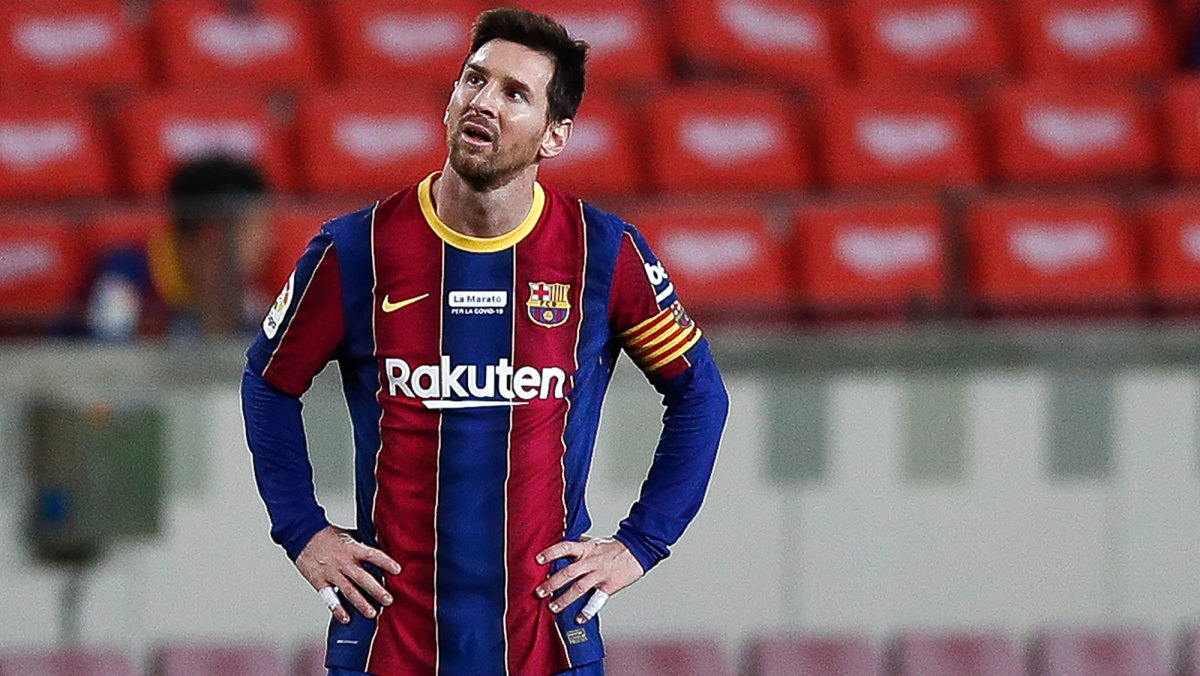Reading the Tea Leaves on Lionel Messi's Future
In roughly six months, Lionel Messi’s contract at Barcelona will expire. On Friday, he can legally begin negotiations with any club outside Spain that fancies picking him up on a free transfer in the summer. That is, in reality, a largely symbolic deadline, and if there is a serious prospect of Messi leaving the only club he has ever played for as a professional, then feelers would have been put out long ago. But still, the fact is that the clock is audibly ticking on him agreeing to a new deal at the Camp Nou, and that’s why Sunday’s hourlong television interview on La Sexta has been subjected to such scrutiny.
Messi insisted he was not about to start publicly negotiating with anybody. He refused to accept the guidebooks to Paris and Manchester that were offered to him by the interviewer. He did acknowledge that he had talked to Pep Guardiola recently, but denied there was any immediate prospect of them linking up again. On the surface, everything was about staying, despite him sending a Burofax to the club in the summer demanding to be allowed to leave. Those frustrations, he claimed, are “behind me.”
He spoke of his enthusiasm for the club at the moment and said he thought Ronald Koeman had been “a great choice” to take over as manager. Yet it’s hard to take that entirely at face value. Barcelona has been wretched this season and sits fifth in La Liga entering Tuesday's match vs. Eibar. A 3–0 home defeat to Juventus in the final Champions League group game may not have meant much in terms of qualification for the knockout stage (although it did push Barcelona to second, and a subsequent draw against group-winning PSG) but it felt symbolic of the malaise at the club.
But at least Josep Bartomeu, the president who had become the focus for much of Messi’s frustration, has been forced to resign. Messi said that he felt Bartomeu had tried to use him as a scapegoat after he raised concerns about the direction of the club, and spoke of how hard it had been to make the decision to send the Burofax, potentially bringing an end to two decades at the club.
Although he maintained the decision to sell Luis Suarez to Atlético Madrid, which currently is atop the table, had not directly influenced his transfer request, he did feel “it was crazy the way his exit was handled and that Barcelona let him go to a direct rival. … He left for free, paying the remaining years of his contract, and he joined a team that fights for the same objectives as us. Unbelievable.”
Barcelona’s recruitment has more generally been flawed for several years, and that is not something that will quickly be resolved, even with presidential elections scheduled for January 24. The timing leaves just a week before the end of the transfer window, so it’s highly unlikely a new president will be able to make any significant changes before the summer.
Messi acknowledged that “whoever comes in will find a very difficult situation. He will have to be intelligent, put everything in order and make a lot of changes for things to go well. … They need to bring in various players, and it’s going to be hard to bring in quality players because there’s no money. The club is in a difficult moment, everything that surrounds Barcelona is bad. It’s in a really bad, bad way. And it’s going to be difficult to get back to where it was.”

And that’s where his assurances about staying begin to sound equivocal. Messi is 33. Time is beginning to run out. He is clear that he wants to win more Champions League titles. For a player of his stature, one in the past 10 seasons is a remarkably low return, albeit there were three before that. But it’s far from clear that Barcelona will be in a position to challenge for major honors any time soon.
He made the usual assurances that he will be trying his utmost this season, but, pressed on his future, said, “In June, we’ll see. … It wouldn’t be right to say what I’m going to do, because I don’t know either.”
And that, perhaps, is the truth of it. Messi genuinely doesn’t know and will wait to see what happens in the club's election and in the months that follow before deciding. He mentioned a dream of playing in the U.S., which is new, but there was no indication of whether he meant for next season or as a preretirement plan in two or three years.
He has spoken in the past of a return to Newell’s Old Boys, the club he has always supported and where he played as a child. But if Manchester City or Paris Saint-Germain really did want him and were prepared to pay his exorbitant salary, it’s hard to imagine Messi turning them down.
For now, though, it feels that all options remain open, and will do so at least until the presidential election—and its ramifications—are known.
More on Messi
manual
